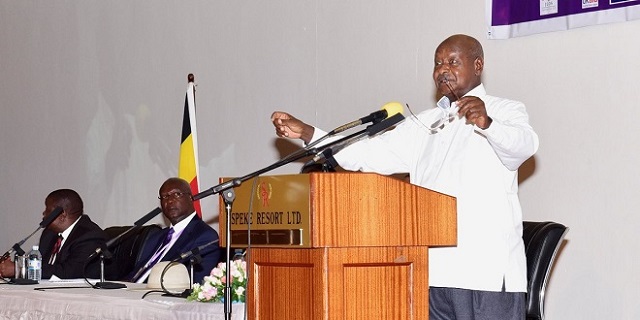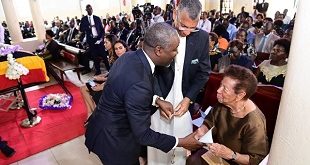
President says it’s his way of dealing with the rampant killings happening in the country
Kampala, Uganda | IAN KATUSIIME | President Yoweri Museveni has repeated his determination to sign death warrants for those who commit offences like murder. He says it is his way of dealing with the rampant killings happening in the country.
While addressing the 20th Annual Judges Conference at Speke Resort Munyonyo on Jan.22, Museveni regretted not signing the death warrants over the years for convicts of murder.
“For us we believe in the old law of Moses of an eye for an eye, and a tooth for a tooth,” he said, “I will support the death penalty until I retire from leadership.”
This was the second time Museveni was citing the death penalty after he said those who kill should be hanged during a commissioning ceremony for prison warders a few days ago.
The judges’ conference which ran from Jan.22- 25 was held under the theme ‘An inclusive judiciary for sustainable development’ and was attended by judges, magistrates, registrars and officials of Evolve; an organisation of lawyers based in the U.K.
Museveni also said he was disappointed by the sentence of eight months handed out by City Hall Court to six butchers found guilty of using chemicals to preserve meat and fish.
“How do you hand out eight months? People who use formalin to preserve meat, those ones deserve twenty years,” he said.
The President also rejected calls for appointment of more judges and their demands for higher pay and retirement benefits saying Uganda was still a recovering society unable to take care of all the demands of civil servants. “How do you fund institutions in a post recovery phase of a formerly failed state?”
He said the country had other competing needs and added it was a deliberate policy for Uganda to prioritise road infrastructure where the Works sector gets Shs4 trillion and the Judiciary Shs134 billion per annum.
Museveni told the judiciary to address the problem of wastage in its sector and that in the wider government manifested in constant travel on so-called benchmarking trips.
Judges’ demands
The Chief Justice Bart Katureebe laid out a list of demands he said were vital for the judiciary to effectively perform its duties. Katureebe said the judiciary needed 532 Grade 1 Magistrates but only 192 are available and 100 Chief Magistrates yet only 42 are present. He said the country needed 82 High Court judges yet there are only 50 and also said that Court of Appeal judges needed to be doubled from the current number of 14.
Katureebe also reminded the president about the promises he made to judicial officers in September 2015 that remain unfulfilled. These include retirement benefits for judicial offers, houses for judicial officers, vehicles for magistrates handling land disputes, and Shs10 billion for the Uganda Judicial Officers SACCO.
The chief justice called for the reinstatement of Local Council Courts which he said provide justice for rural communities. “LC Courts will shoulder the millions of unmet needs. If this institution is reintroduced, it will help a great deal in solving cases in villages because there are fewer negative emotions involved.”
The head of the judiciary lamented the perennial problem of case backlog that is most common in land, family and criminal cases. “An average land case takes 15 months to resolve”. However, Katureebe noted that the judiciary had made some strides with the automation of courts, introduction of small claims procedure, plea bargaining; the latter two which have lessened congestion in detention centres.
Magistrates cry out
Godfrey Kaweesa, the Chief Magistrate of Iganga and president of Uganda Judicial Officers Association told The Independent that Iganga currently has no resident judge yet it has a High Court circuit and therefore judges have to come from Jinja to handle cases. “When the judge comes, he has to sit in the chambers of the chief magistrate and the chief magistrate sits in the library.”
Kaweesa also lamented a discrepancy between the welfare of judges and magistrates even though the entire judiciary is grappling for more resources altogether.
He says after the Penal Code Amendment Act in 2009 and the Magistrates Courts Amendment Act, the jurisdiction of the chief magistrates were enhanced but it is yet to be translated into practice because it did not come with a budget. Under the State Brief funds, chief magistrates handle semi-permanent cases like defilement, arson where maximum sentence is life imprisonment. “In this arrangement, accused persons must be represented by the state yet money under State Briefs is so limited and the sessions have 40 cases per month”.
He says lawyers are shunning the chief magistrate’s court to represent accused persons in this scenario and subsequently suspects are languishing in jail. “There is only Shs1 million per month for all cases, yet the judges were getting Shs40 million for the cases; this is form of a discrimination”.
He also said the judges are more privileged through benefits like security and yet magistrates dispose of 80% of judiciary work but with a much smaller budget.
 The Independent Uganda: You get the Truth we Pay the Price
The Independent Uganda: You get the Truth we Pay the Price


